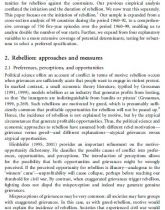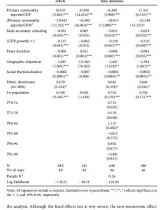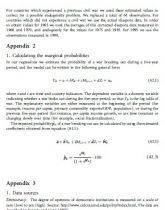Hledej
Zobraz:
Univerzity
Kategorie
Rozšířené vyhledávání
12 663
projektů
Collier P., Hoeffler A. - Greed and grievance in civil war
| Přípona |
Typ studijní materiál |
Stažené 0 x |
| Velikost 0,2 MB |
Jazyk český |
ID projektu 9557 |
| Poslední úprava 06.02.2017 |
Zobrazeno 1 018 x |
Autor: clean.bandit |
 Sdílej na Facebooku
Sdílej na Facebooku |
||
| Detaily projektu | ||
- Cena:
4 Kreditů - kvalita:
81,3% -
Stáhni
- Přidej na srovnání
- Univerzita:Masarykova univerzita
- Fakulta:Fakulta sociálních studií
- Kategorie:Humanitní vědy » Politologie
- Předmět:-
- Studijní obor:Bezpečnostní a strategická studia
- Ročník:5. ročník
- Formát:PDF dokument (.pdf)
- Rozsah A4:33 stran
1. Introduction
Civil war is now far more common than international conflict: all of the 15 major armed conflicts listed by the Stockholm International Peace Research Institute for 2001 were internal (SIPRI, 2002).
In this paper we develop an econometric model which predicts the outbreak of civil conflict. Analogous to the classic principles of murder detection, rebellion needs both motive and opportunity. The political science literature explains conflict in terms of motive: the circumstances in which people want to rebel are viewed as sufficiently rare to constitute the explanation. In Section 2 we contrast this with economic accounts which explain rebellion in terms of opportunity: it is the circumstances in which people are able to rebel that are rare. We discuss measurable variables which might enable us to test between the two accounts and present descriptive data on the 79 large civil conflicts that occurred between 1960 and 1999. In Section 3 we use econometric tests to discriminate between rival explanations and develop an integrated model which provides a synthesis. Section 4 presents a range of robustness checks and Section 5 discusses the results.
This analysis considerably extends and revises our earlier work (Collier and Hoeffler, 1998). In our previous theory, we assumed that rebel movements incurred net costs during conflict, so that post-conflict pay-offs would be decisive. The core of the paper was the derivation and testing of the implication that high post-conflict pay-offs would tend to justify long civil wars. We now recognize that this assumption is untenable: rebel groups often more than cover their costs during the conflict. Here we propose a more general theory which juxtaposes the opportunities for rebellion against the constraints. Our previous empirical analysis conflated the initiation and the duration of rebellion. We now treat this separately. This paper focuses on the initiation of rebellion.1 Our sample is expanded from a cross-section analysis of 98 countries during the period 1960-92, to a comprehensive coverage of 750 five-year episodes over the period 1960-99, enabling us to analyse double the number of war starts. Further, we expand from four explanatory variables to a more extensive coverage of potential determinants, testing for robustness to select a preferred specification.
Civil war is now far more common than international conflict: all of the 15 major armed conflicts listed by the Stockholm International Peace Research Institute for 2001 were internal (SIPRI, 2002).
In this paper we develop an econometric model which predicts the outbreak of civil conflict. Analogous to the classic principles of murder detection, rebellion needs both motive and opportunity. The political science literature explains conflict in terms of motive: the circumstances in which people want to rebel are viewed as sufficiently rare to constitute the explanation. In Section 2 we contrast this with economic accounts which explain rebellion in terms of opportunity: it is the circumstances in which people are able to rebel that are rare. We discuss measurable variables which might enable us to test between the two accounts and present descriptive data on the 79 large civil conflicts that occurred between 1960 and 1999. In Section 3 we use econometric tests to discriminate between rival explanations and develop an integrated model which provides a synthesis. Section 4 presents a range of robustness checks and Section 5 discusses the results.
This analysis considerably extends and revises our earlier work (Collier and Hoeffler, 1998). In our previous theory, we assumed that rebel movements incurred net costs during conflict, so that post-conflict pay-offs would be decisive. The core of the paper was the derivation and testing of the implication that high post-conflict pay-offs would tend to justify long civil wars. We now recognize that this assumption is untenable: rebel groups often more than cover their costs during the conflict. Here we propose a more general theory which juxtaposes the opportunities for rebellion against the constraints. Our previous empirical analysis conflated the initiation and the duration of rebellion. We now treat this separately. This paper focuses on the initiation of rebellion.1 Our sample is expanded from a cross-section analysis of 98 countries during the period 1960-92, to a comprehensive coverage of 750 five-year episodes over the period 1960-99, enabling us to analyse double the number of war starts. Further, we expand from four explanatory variables to a more extensive coverage of potential determinants, testing for robustness to select a preferred specification.
Klíčová slova:
rebellion
regresion
analysis
robustnes
interpretation
conclusion
acknowledgements
Obsah:
- 1. Introduction
2. Rebellion: approaches and measures
3. Regression analysis
4. Robustness checks
5. Interpretation and conclusion
Acknowledgements
References
Appendix 1
Appendix 2
Appendix 3


